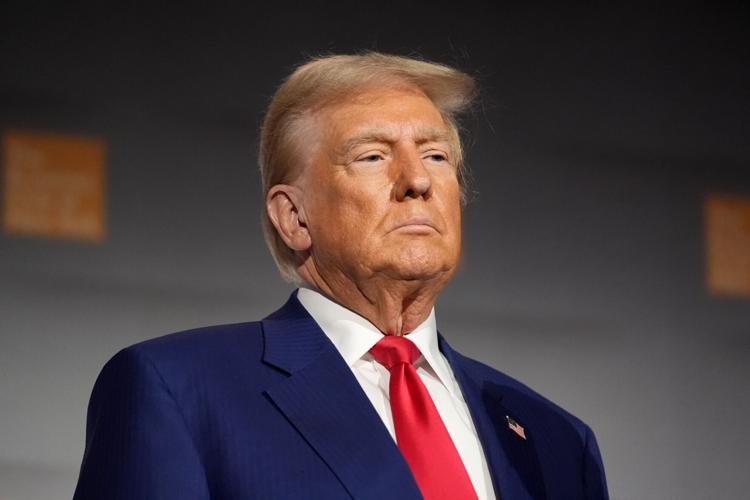In a recent interview with NBC News, former President Donald Trump made a startling admission that has sent shockwaves through his MAGA fan base. Just before taking the stage for a rally in Potterville, Michigan, Trump’s comments about abortion have angered many of his supporters, leading to a flurry of backlash on social media. One tweet encapsulated the sentiment, stating, “Don’t ever again try to bully me into voting for this putz.” This reaction highlights the growing dissatisfaction among his core supporters, particularly regarding his stance on a pivotal issue.

During the interview, Trump was questioned about an abortion-related amendment on the ballot in Florida that seeks to overturn the state’s six-week ban on the procedure. In a significant shift from his previous positions, Trump stated, “I think the six weeks is too short; it has to be more time.” This flip-flop is particularly striking given his history of advocating for states’ rights concerning abortion, famously claiming credit for overturning Roe v. Wade. His latest remarks suggest a retreat from that hardline stance, indicating a desire to appeal to a broader audience amid fears of losing crucial female voters.
Trump’s comments reflect a larger issue within the Republican Party, which is struggling to maintain support among suburban women and other demographics concerned about reproductive rights. His typical salesman-like rhetoric—“I want more weeks, many more weeks”—is seen by many as an attempt to save face rather than a genuine policy position. Critics argue that this change is a desperate move to mitigate the fallout from the party’s current stance on abortion, which many perceive as too extreme.
An Axios article aptly critiques Trump’s inconsistency, noting that he has long boasted about his role in dismantling Roe v. Wade while now expressing dissatisfaction with state-level decisions. This contradiction raises questions about his leadership and ability to take a firm stand on critical issues. It also highlights the growing divide between Trump’s rhetoric and the realities faced by voters, particularly women, who are increasingly concerned about their reproductive rights.
Following the interview, Trump took the stage in Potterville, visibly agitated and gripping the podium as he delivered his speech. He made controversial statements, including a bizarre assertion that the Presidential Medal of Freedom is more significant than the Medal of Honor. This dismissal of the sacrifices made by service members has only reinforced long-standing criticisms of Trump’s attitudes toward the military, echoing past comments where he referred to wounded soldiers as “losers” and “suckers.” His lack of sensitivity in discussing such serious matters raises further concerns about his fitness for leadership.
In addition to his comments on abortion and military honors, Trump also attempted to stoke outrage over cultural issues, claiming there were multiple trans women boxing in the Olympics. This assertion was quickly debunked, yet it reflects his strategy of leveraging culture war topics to rally his base. However, such tactics may backfire, as they often rely on misinformation and exaggeration, alienating moderate voters who are crucial for electoral success.
In stark contrast to Trump’s erratic performance, Vice President Kamala Harris has been actively engaging with voters, delivering speeches that resonate with a sense of hope and empowerment. During a recent appearance in Savannah, Georgia, Harris energized the crowd, emphasizing the importance of freedom and opportunity. Her ability to connect with young voters and address their concerns stands in sharp contrast to Trump’s divisive rhetoric.
As the 2024 election approaches, the stakes are high for both parties. Trump’s recent missteps could have significant repercussions, particularly as he struggles to maintain support among key demographic groups. The backlash from his own supporters over his abortion comments signals a potential fracture within the MAGA base, which could prove detrimental in a closely contested election.
Moreover, the Democratic Party is capitalizing on these missteps, rallying support around candidates who prioritize reproductive rights and inclusivity. The enthusiasm generated by Harris and other Democratic leaders suggests that they are effectively mobilizing voters, especially women and young people, who are eager for change.
In conclusion, Trump’s recent interview and subsequent rally have highlighted significant vulnerabilities in his campaign. His flip-flopping on abortion, dismissive comments about military honors, and reliance on culture war rhetoric may alienate crucial voter segments. As the election draws near, both parties must navigate these complex dynamics, with the potential for significant shifts in voter sentiment shaping the outcome. The contrast between Trump’s approach and the Democratic Party’s focus on empowerment and inclusivity could ultimately determine the direction of the upcoming election.




